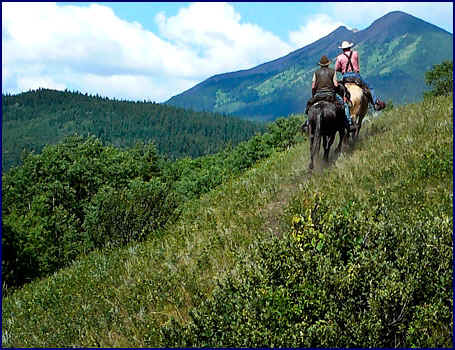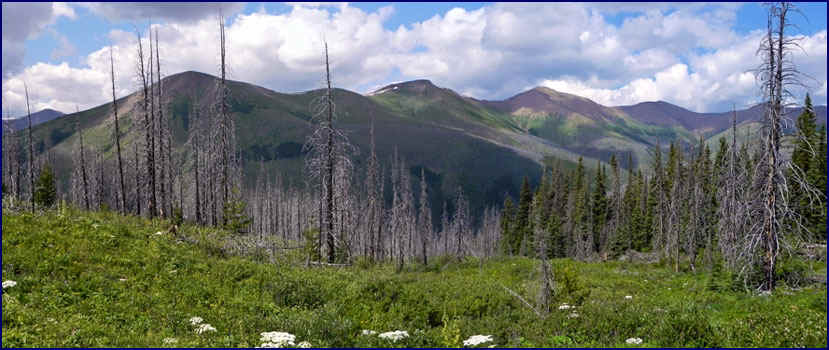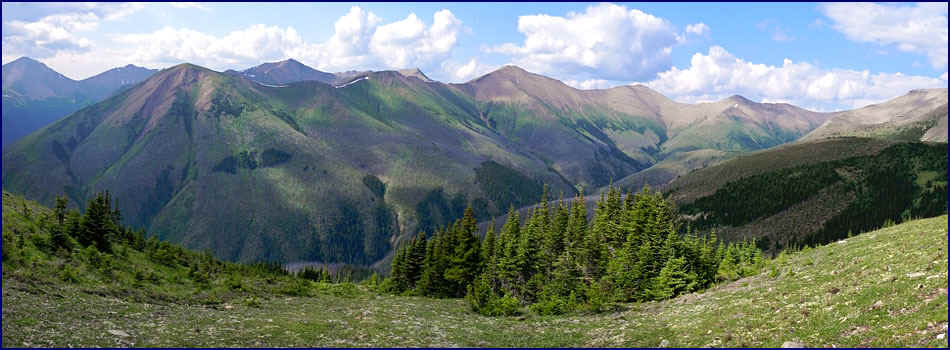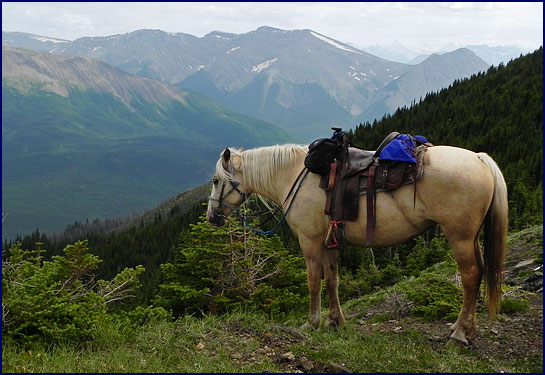|
July 31
Having slept well, we woke up at
seven to a crisp cool morning.
We put on our jackets and went out for a walk.
It was very still and quiet, and we seemed to be the only
ones about. We
followed a small path behind the corral down to the river where
the horses went to drink. We
explored along the creek by the camp.
The sound of bells heralded the
arrival of the horses. The
wranglers came out to meet them as they entered camp, giving each
horse a few bites of oats as it entered the corral.
We stood by the fence and watched, and the wranglers told
us about the personalities of the different horses and mules.
Paul checked each one over carefully, petting and rubbing
their faces in his quiet way as he examined them for saddle sores
or injuries. His love
of these animals was evident in the way he handled them and
whispered quiet secrets in their ears.
Paul then built a 'smudge fire';
he started a small campfire in the middle of the corral, then
shoveled a bit of manure over it, causing it to smolder and smoke.
The horses would
gather around it to keep the flies and mosquitoes off during the
day. The wranglers
told us that early in the season the horses usually come in to the
corral on their own, eager for the handful of oats.
But later in the season when the grass gets scarce close to
camp, the wranglers have to go out on foot and find them in the
mornings, sometimes miles away, tracking them by the sound of
their bells.
There were 16 horses and 7 mules at the camp.
I had never been around mules much before, and was
surprised by their interesting and affectionate personalities.
The wranglers told us a lot about them; we learned that
mules live for up to fifty years, and are very intelligent.
They have steady personalities and do not panic as easily
as a horse, but they can be very stubborn.
They said that a mule never forgets, and will hold a grudge
against someone if they are not treated right.
They are hardy and strong, and can carry a bigger load than
a horse. Their feet
are very tough, and they generally do not need shoes.
The mules will jump in and out of the corral at will; the
wranglers told us about one who would jump a five foot fence while
tied to it, without ever taking the slack out of his lead rope.
Once the horses were all in the corral, it was time for
breakfast. It was my
first experience with cowboy coffee.
It was boiled on the stove in a big iron pot, grounds and
all; when it was ready they would add a dash of cold water to
settle the grounds to the bottom, and serve it in tin cups.
It was wonderful - I thought it might be the best coffee I
had ever tasted. Lois
served us an excellent breakfast of French toast and bacon, cooked
on the camp stove. She
poured the extra bacon grease on the campfire, causing the flames
to shoot up with a whoosh.
It took a while to get all the horses ready, so it was
11:20 by the time we got under way. There were nine of us
riding out that day. Shelly
and Louise, the other two guests, were mounted on a pair of big
roan Quarter Horse/Percheron crosses.
Pete led the group on an attractive buckskin that looked
like Ben Cartwright's horse. Pat,
a friend of Pete's, came along for the ride - he was there helping
out on sort of a working vacation.
Rob the blacksmith was a part of the group, along with a
young wrangler named Dave, and Paul brought up the rear on a
somewhat flighty appaloosa. The
wranglers all carried rifles as well as an assortment of ropes,
axes and handsaws. Paul
also had a chainsaw strapped to his saddle.
We set off through the
poplar forest, and before long headed up the mountainside.
I rode Magic again, but Jineen was given a huge black
Percheron cross named Thunder.
She found him lovely to ride, very responsive, though an
old injury made him a bit sore when crossing the rocks. We
noticed that the horses were trained to follow head to tail, and
they resisted any attempts we made to ride side by side.
They also jealously guarded their place in line, pinning
their ears and swishing their tails in annoyance if another horse
tried to pass.
We followed a steep path up
through the trees. After
about an hour we came out on a high open hillside with beautiful
views down over the Smoky River and the mountains beyond.
Since Rob was new to the outfit, Paul was clueing him in on
what to expect; he said that later in the season Rob would have to
come up here on foot to find the horses in the mornings.
Rob nodded and looked resigned.
We continued up through woods and
meadows, the trail becoming steeper and harder to follow as we
wound our way around to the far side of the mountain.
As we rode, Pete told us about the area.
Willmore is unspoiled wilderness, and has changed little
from how it was hundreds of years ago.
The fact that there are no roads and no motorized vehicles
allowed keeps the park natural; the only access is by foot or
horseback. It is used
by hikers and trail riders in the summer, and in the autumn it is
a big hunting area. During
winter trappers still maintain trap lines in Willmore.
I don't care for hunting and I detest trapping, but I do
respect that we don't all like the same things, and it is largely
because of its appeal as a hunting area that the land has been
preserved as wilderness.
|


On the Trail |
There were many trees down across the trail, and the horses
would carefully step over them, one foot at a time, even when they
were belly high. All
of the horses are used to both ride and pack, and Paul told us
they learn in a hurry not to jump when they are carrying a pack.
He said if you are leading a string of six or seven loaded
pack horses and one of them jumps, it is a real problem!
Several times we came to fallen
trees leaning across the trail above us; even when there was
plenty of room to cross underneath them, Pete always led us
carefully around - he said they were called widow
makers, and that you should never go under them.
At one point Shelly dropped her
hat, and Paul gallantly retrieved it for her - without
dismounting! He
crooned, 'stay, stay'
to his nervous mount, who unlike the chainsaw-broke Magic, was
none too steady. Then
much to the admiration of the group, while standing balanced on
one foot, he took the other out of the stirrup, leaned way over to
the off side, and reached down to the ground to grab the
hat.
The trail continued to climb, and
presently we came out in an area where a forest fire started by
lightning had gone through about 20 years ago.
Huge portions of the mountainsides around us had been
burned. We rode
between tall bare pines, long dead but still standing, and the
forest floor was thick with undergrowth and new trees.
Fireweed was blooming everywhere; these tall purple flowers
flourish after the older growth is burned off.
Pete explained how fire is an important part of the natural
order, and good for the ecosystem.
It clears out old trees to allow areas of new growth,
creating habitat and forage for the wildlife.
Once again in an educational tone, Paul
informed Rob that he would have to track the horses up there in
the mornings later in the year.
Rob looked dismayed. Pete
told us about grizzly bears, and their habits and territory.
As we went higher up, the trail
was very overgrown; it was the first time it had been traveled
that year. In several
places there was deadfall across the trail that could not be
negotiated; Paul would then dismount, pull out the chainsaw he
carried on his saddle, and clear the trail.
Magic was marvelous,
but the trail was relentlessly steep, and I could feel her tiring
on this rugged terrain. The
horses had just begun work after having been turned out for
months, so they were not very fit.
Despite this, their stamina was remarkable as they
struggled up the steep rocky slopes.
The horses would drink at each stream crossing, but water
became scarcer as we went higher.
|

The view from 'The Balcony.'
|
We came to a natural shelf on the mountainside, which Pete
called 'the balcony.' We
stopped and tied the horses to trees, then walked around a bit,
stretching our legs. Paul
started a campfire to cook lunch; hot dogs were produced from the
saddlebags, complete with buns, ketchup, mustard and relish.
Pete and Rob 'glassed' the mountain slopes opposite us with
a high powered hunting scope, looking for wildlife.
Pete spotted three elk, several miles away.
With a touch of sadistic glee,
Paul told Rob he would have to hike up here to find the horses in
the mornings during hunting season.
Rob looked aghast. It
seemed a really long way to go on foot in search of the herd; I
wondered if Paul was yanking Rob's chain a little.
After lunch we continued upward,
and as we got nearer to the top of the mountain the trail became
impossibly steep. I
felt sorry for the horses as they scrambled up the severe incline.
In the western saddles, you can't really get up off their
backs on the steep bits like you would in an English saddle.
The horses were hot, and very thirsty now - we had been
unable to find a place to water them for some time.
They struggled up the switchbacks, climbing ever higher.
The trail gradually faded away as we came out above the
treeline, and we made our way across the open tundra, looking for
the path of least resistance.
We were almost to the top.
Paul looked at Rob, deadpan, and
informed him that he would often have to search for the horses up
here in the mornings - but finally even Rob realized that Paul was
having him on.
We made a last push up to the
summit. We stood on a
narrow saddle on top of Stern Mountain and gazed at the incredible
vista before us. There
were magnificent views 360 degrees around us. It
was an amazing spot; we could see forever.
|

Looking down over the Smoky River from the top of Stern
Mountain. |
It couldn't have been a more perfect day.
The sun was shining, the air was warm , and a fair breeze
was blowing. We left
the horses standing, happy for a rest, and we walked along the
ridge top. Pete's
friend Pat had been up there before, and he showed us a little
knoll further up the ridge where the views were even more
spectacular.
I didn't want to leave the
mountaintop. I would
like to have stayed there for hours, contemplating, soaking in the
beauty, reveling in the wildness of it all.
To just sit and look, and listen.
The mountains have a language of their own - there are
stories in the wind, but we don't often take the time to listen to
them. We get so busy
speeding through life, but today, at least for a little while,
life had unfolded at the speed of a horse's walk.
I savored each moment, and the time we spent on that
mountaintop will remain engraved in my memory.
|

The view down the back of Stern Mountain. |
All too soon it was time to leave.
It was after five o'clock
when we started down the mountain, with the horses now
rested and eager to get home.
We worked our way down the steep slope, picking our way
through the tundra, looking for safe footing.
Magic was impatient because she likes to be near the front
(so do I), but we were taking our turn near the rear of the line.
We took a slightly different route than going up, and if
anything it was even steeper.
We came across a tiny stream bubbling out of the hillside,
and the horses drank and drank.
Going down the mountain was much
less exertion for the horses, but the way was steep and sometimes
treacherous; I was thankful for Magic's surefootedness.
I considered what my own horse, Drifter, would think of the
lifestyle of these mountain horses; he is spoiled and pampered in
comparison. But I
decided that on the whole he would like it; he loves trail riding,
and I think he would quickly adapt to looking after himself more.
He wouldn't be too thrilled about being expected to work
for six or eight hours in a day, but he would really like the part
where he got to roam free in the wilderness at night.
Though I'm not sure he would take too well to being a pack
horse . . .
|

Magic waits patiently at the top of Stern
Mountain.
|
We arrived back in camp at seven o'clock, eight hours after
setting out, tired but thoroughly happy. That
ride to the mountaintop will remain in my memory, added to the
collection of moments in life I shall always cherish and hope
never to forget.
After so many hours in the
saddle our knees were aching.
Upon dismounting I noticed that my legs seemed to be shaped
a bit different; now I understand why cowboys are bowlegged. But
already my muscles were becoming accustomed to the western saddle,
and I felt less sore than the day before.
And if we were tired, we could just imagine how our horses
must have felt!
That evening was a perfect time to make use of the
excellent shower tent; when the wood stove is going the water runs
continually at just the right temperature. Once
clean, we all gathered around the campfire, talking about what a
great day it had been, and how much we had enjoyed the fabulous
ride. The only thing
that could have made it any better would have been to see bears.
Pete told us that tomorrow we would ride even higher.
Lois served another excellent
camp-cooked meal; ham, potatoes, salad, and amazing cinnamon rolls
for dessert. I raised
my cup of wine and made a toast: To horses, to mountains, to
wranglers and cooks.
|

Pete on Stern Mountain.
|
|